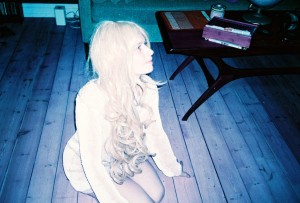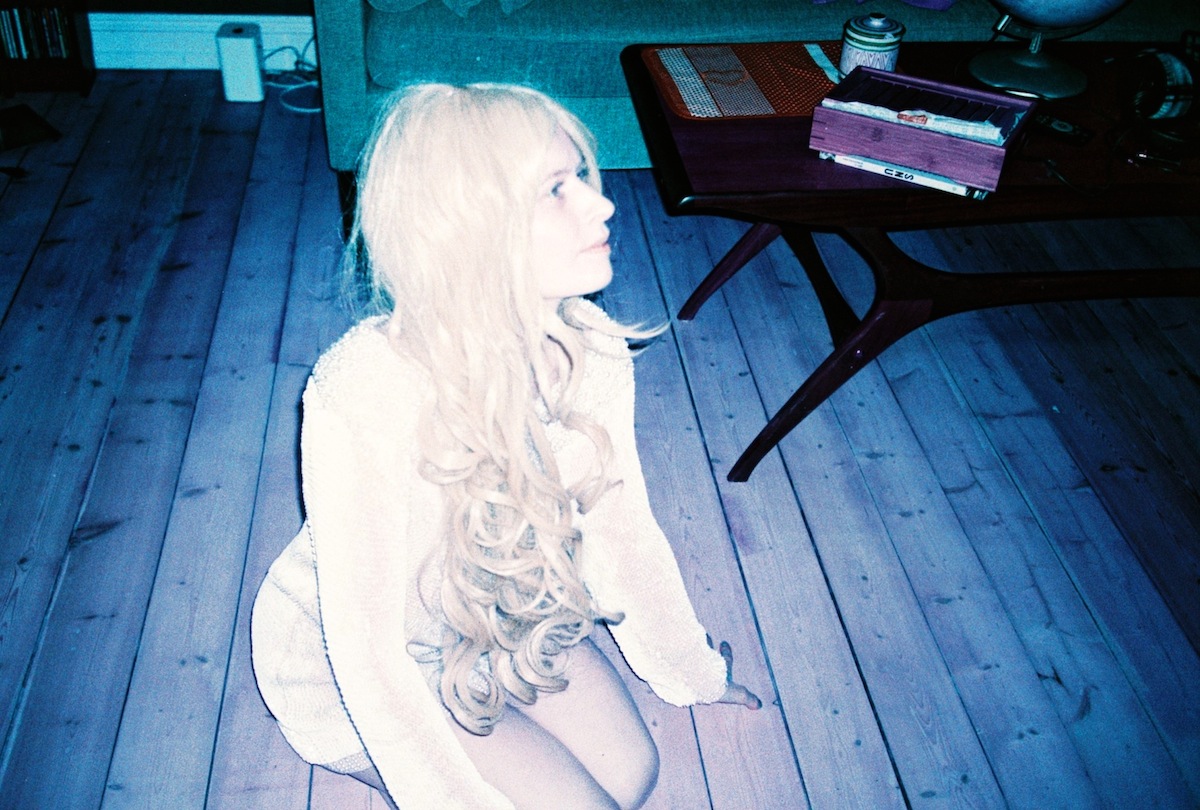 “It’s about figuring out different types of becoming, from dreams and experiences: from our out of body experiences to our experiences out of our roles or our gender roles.” The intriguing, gently-spoken Norwegian ‘existentialist’ pop artist Jenny Hval is musing about the inspiration behind her wonderful recent single ‘Sabbath.’ It’s like some elliptical dream sequence that switches from sweetly sung Francois pop melodies to spoken word brutality laced with off-kilter religious imagery and sexual discovery (“It’s about holding and being held”). She continues “The song started out in 1986 and I worked on it as a spoken word piece in 2001, but after a while I got tired of that and wanted to do something beautiful with it. It’s with the video being on tour where you’re kind of out of your world, you’re in a vulnerable position, but you are also with people and yet also in a safe environment…”
“It’s about figuring out different types of becoming, from dreams and experiences: from our out of body experiences to our experiences out of our roles or our gender roles.” The intriguing, gently-spoken Norwegian ‘existentialist’ pop artist Jenny Hval is musing about the inspiration behind her wonderful recent single ‘Sabbath.’ It’s like some elliptical dream sequence that switches from sweetly sung Francois pop melodies to spoken word brutality laced with off-kilter religious imagery and sexual discovery (“It’s about holding and being held”). She continues “The song started out in 1986 and I worked on it as a spoken word piece in 2001, but after a while I got tired of that and wanted to do something beautiful with it. It’s with the video being on tour where you’re kind of out of your world, you’re in a vulnerable position, but you are also with people and yet also in a safe environment…”
It’s lifted from her extraordinary fifth long player ‘Apocalypse, Girl’ which was released earlier this year. It’s more than just another album of music, it’s a journey into the mind of Norwegian Jenny Hval, balancing between hallucinatory narratives, fact and fiction; joy and pain; restless anxiety and revelation; given voice by confessions from her sub-consciousness and fragments of confronting beat poetry. It’s an intoxicating and transfixing mixture of multi-coloured shifting found sounds, instrumental loops are the fractured musical backdrops that are decorated by Hval’s unique post-modern, post-feminist voice. And it is truly a unique voice – not just a vocal – slipping between violent, introspective and self-aware spoken word imagery, and fragile vulnerable melodies. This is bold, brave, pop music that dives deep into the abyss and wrestles what with what it means to be human in 2015.
Typical of this patchwork of sounds and bricolage of melodic and sonic structures is the early Bjork-like, hypnotising, dream-like throb of ‘Heaven’ which switches from whispers and spoken word and clopping avant-garde textures to swooping extraordinary angelic vocals that dissect the body: naive yet tortured. ‘I’m 33 now, that’s Jesus’s age,’ she sings, gliding on the wings of harps into the majestic awe-inspiring ether, before rocking back and forth humming. “I think that I’ve also used memories of childhood experience as something that is to share to the point where I am remembering other peoples experiences too,” Hval points out, “and I decided to remember all of them, to make it universal by making one person experience all of it which is an incredibly interesting idea. “
Hval isn’t a conventional musician or vocalist; she doesn’t work within a structured format of writing, her ideas emerge from a feeling, or self-talk, or a fragment of culture she’s consumed. Her ever-shifting and fractured lyrical and vocal narratives are in keeping with the sounds she crafts, a tapestry of found sounds, samples and organic instrumentation that is at once disorientating and affecting. “It does vary with some of the songs,” Hval notes, “I come into the song writing session or attempt with some kind of some kind of conversational tool or feel, it could be lyrics or wanting to investigate the melodic element or tempo of a conversation or other times. The spoken elements of conversations. It’s wanting to explore an atmosphere in a sound piece I have made or a melody I am exploring.” The all-consuming technological and post-millennial world and how we struggle to come to terms with that experience as human beings inspires Hval’s work “I do think that I pick up on a lot of ways that information is being thrown around and process that a lot, and then, if it stays interesting, eventually it will appear in my lyrics or the way I make something, like sonic textures or energy. I am very concerned with modern existentialist themes. I find a lot of the time that’s how I feel about it, and then it’s called feminism, which it is. I am definitely a feminist and I am female, but it’s a shame to overlook the fact that it’s kind of a universal humanist experience.” It sounds like half-remembered fragments of culture are processed and rather than blankly recreated as pastiche are instead reassembled in her image, she continues “A lot of very interesting musicians are working with sound and electronic music and the way music and information is made technologically. I feel a kind of closeness with it, even if I am not able to work that way. But I am able to talk about it in my work without the technological, but more the philosophical or psychological side of the every day of experiencing it.”
Jenny Hval‘s been developing her sound since the release of her debut album in 2006 and recently broadening her artistic pallet beyond just music: through working with poets and artists. The genesis for ‘Apocalypse, Girl’ was laid when she asked Norwegian noise legend Lasse Marhaug to produce her next record following a discussion about film soundtracks and a different approach to making music. She has even dabbled working with sound installations, the influence of which ripples throughout the record “I have done two (sound collages) but I couldn’t call myself an artist. But when working with it or exploring it, I would say that I have very much enjoyed it, when I have done it. I have still thought when I have done that. I have thought like I am still composing and I always thought that was a bad thing. When I talked to other sound artists, they thought that was great,” Hval reveals before conceding that her art may at times be daring and touching on the avant-garde but is still rooted in the exploration of musical form. “Even when I have been creating these things, I have thought very much the way I have been composing music. Some writers have a standard way of music and that can still make beautiful music. I wouldn’t say I make better or worse music than a standard song writer, it’s very different for different people. ” She concedes, “some people find endless inspiration from a small format or way of working; other people get bored, like me…”
This unique, post-modern way of working may also be informed by Hval’s experiences as a creative writing student at the University of Melbourne, Australia in the early parts of this millennium, and her confidence gradually built through a series of long-playing releases, including 2013’s ‘Innocence is Kinky’ which she worked with P J Harvey collaborator John Parrish. She concludes that her studies gave her approach to pop music a more nuanced depths: “I studied in a way that made it natural to bring a lot of theories and a lot of academic ideas to my music; I could just pull everything into my study of it. I was very drawn to making a lot of music even if I didn’t have too. I was in bands, but that was always collaborative. Music was the least serious of my work for a long time. “Think big, girl, think Kingsize,” suggests to herself on her spoken word album opener, with allusions to sex and fiercely insightful self-revelation. For such a guarded soul, this kind of jolting prose hasn’t always been easy for Hval to share, but she was constantly working. “I had so much time to write so many songs and sound pieces before I even released anything. I didn’t expose myself and get scared. I am a person who could have easily gotten very frightened if I had released something with my type of lyrics at 20 and gotten a lot of bad feedback. I don’t know, maybe I am being hard on myself, but I am kind of glad I didn’t now.”
‘Are we mothering ourselves now/Since statistics and newspapers tell me that I am unhappy and dying/I need a man and child to make me happy,” implores Hval on the outstanding lead single ‘That Battle Is Over’. It inches closer to the edge of history, powered by a drum beat and a rumbling undercurrent; this sweetly sung melody is undercut with brutal self-doubt borne of modern consumerism culture that holds you down, defines your role and rips apart individual self-worth. “It was written after I watched this documentary about the history of feminism. There was some theorist speaking about the idea of the female subject in the 80s.” Hval says, talking about its inspiration, “After all the hard work of the 70s, women were finally being granted as subjects in the media; they were women had families and kids. The media were saying women were doomed because of feminism. In recent years, there’s been lots of debates about these trolls on the internet saying that men are unhappy because of feminism,” she laughs, “which is the same thing but turned on its head! All of it is expressing something really dark; they are not explaining the problem, which I thought was a really interesting subject to address. So I just touched on that superficially then moved onto something more modern in the song.”
Hval’s work may be constantly shifting: daring and brave, but she finds the blurring between real life and online life troubling. “I think about the fact that I’m very outspoken in lyrics or in interviews, but I rarely say things on social media. I find that very hard. I try very hard,” she notes. It’s this hyper-real lives lived through pixels and with very little actual human contact, that troubles her: “My way of doing it is not expressing mythologies or stereotypes because I am working very hard not to see the world through stereotypes. Social media is very hard for me because everything is myth building and a sheen; everything is in the same font. It’s just the same.” For Hval this fosters a uniformity that makes the dissemination of information to be controlled and recycled as if its fact. “It’s happening now with the internet. It’s very easy for people with a lot of power to put out information and disagreeable information, and it’s all just in one stream. Somebody’s dress is as important as a piece of information about a government. It’s stylised the same way. It’s quite a world to watch and become human in and it’s very difficult.”
Jenny Hval plays the following dates in the UK this week. She promises a surprising live show which may or may not include video projections and collaborators. We wouldn’t expect anything else from one of 2015’s most captivating and self-revelatory artists.
November dates:
05 – Glasgow (UK), The Hug & Pint
07 – Leeds (UK), Brudenell Social Club
08 – Manchester (UK), Soup Kitchen
09 – Bristol (UK), The Lantern
11 – London (UK), Hoxton Square Bar & Kitchen




